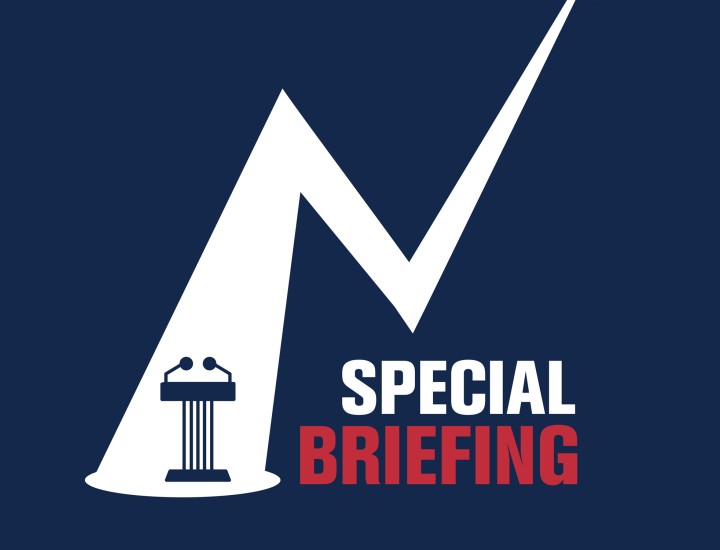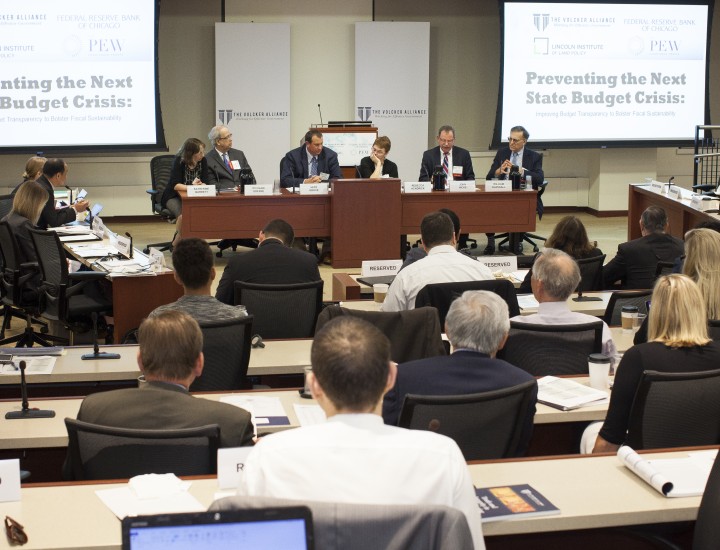Volcker Alliance and Penn Institute for Urban Research Host Fifth Briefing on COVID-19 and Federal Reserve Support for States and Localities
FOR IMMEDIATE RELEASE
CONTACT:
Neilia Stephens, Volcker Alliance
[email protected]
347-683-9625
Cara Griffin, Penn Institute for Urban Research
[email protected]
646-343-0155
VOLCKER ALLIANCE AND PENN INSTITUTE FOR URBAN RESEARCH HOST FIFTH BRIEFING ON COVID-19 AND FEDERAL RESERVE SUPPORT FOR STATES AND LOCALITIES
Major municipal investors and GFOA federal liaison featured in exclusive panel discussion
NEW YORK, NY (May 14, 2020)—The Volcker Alliance and the Penn Institute for Urban Research hosted a Special Briefing today on the Federal Reserve’s recent action establishing the $500 billion Municipal Liquidity Facility (MLF), as well as important updates to the MLF announced on May 11, which will impact how and whether states, counties, cities, and public agencies affected by the COVID-19 pandemic are able to access credit.
The discussion featured presentations by Patrick Brett, Managing Director, Municipal Debt Capital Markets and Capital Solutions, Citigroup; Emily Swenson Brock, Director, Federal Liaison Center, Government Finance Officers Association; and Peter Hayes, Managing Director and Chief Investment Officer, Municipal Bonds Group, BlackRock. Penn IUR Co-Director Susan Wachter and William Glasgall, Senior Vice President and Director of State and Local Initiatives at the Volcker Alliance, served as moderators. The event was the fifth in the Special Briefing series of online conversations featuring experts from the Volcker Alliance’s national research network and Penn IUR, along with other leading academics, economists, and fiscal policy leaders from around the US.
The consensus of the presenters on today’s call was that the MLF, which was established under the CARES Act to help relieve strains in the $3.8 trillion market for state and local debt, will serve as a backstop but will prove most useful for the riskiest entities looking to borrow. Nonetheless, the outlook for a deeper revenue declines as the crisis continues makes the extension of this tool through December very helpful. The speakers pointed to the likely need to extend beyond this date to deal with further disruptions in the market.
Mr. Brett said that the MLF will prove most useful for “the lowest rated issuers, or for issuers who need to borrow the largest amount in the market.” He cautioned that additional strategies would likely be necessary “to get direct aid into state and local governments,” as their budgets in totality are twice that of the federal government and they employ twenty million people. Otherwise these entities may “act as a brake on the recovery” as was the case in the 2008 financial crisis.
Noting the disappointment among issuers that the MLF had not been launched in tandem with other financial tools, Mr. Hayes cited “a great deal of uncertainty around municipal credit,” as state and local governments “don’t know what the long-term impacts of the downturn are going to be.” He added that the cost of capital could threaten the long-term ability to provide basic services and spend on needed infrastructure improvements.
Ms. Brock indicated that for some entities “the MLF has shown to be an effective backstop and is a very strong step in the right direction.” Nonetheless, her surveys have found that “there are still a fair amount of issuers who are finding capital in other ways.” She expects a worsening fiscal situation as entities account for revenue shortfalls over the coming months and hopes for the MLF “to be up and running as quickly as possible, because it does have immediate backstop effects.”
On May 21, the Volcker Alliance and Penn IUR will host a Special Briefing titled, COVID-19 and Future of US Aid to States, Counties, and Cities after the CARES Act, featuring Earl Blumenauer, Democratic Congressman from Oregon’s Third District and Member, House Ways and Means Committee and William A. Galston, Senior Fellow, Brookings Institution Governance Studies Program, and Wall Street Journal columnist. Register here.
Additionally, recordings of the entire Special Briefing series are available here.
The Volcker Alliance advances effective management of government to achieve results that matter to citizens. The nonprofit, nonpartisan organization is inspired by the legendary public service of our founder, Paul A. Volcker, former chairman of the Federal Reserve, and his vision of a public sector workforce with the experience, preparation, and commitment to ensure that government is accountable and delivers with excellence. Visit volckeralliance.org to learn more. Follow us on social media @VolckerAlliance and subscribe to the Volcker Alliance newsletter for the latest news and developments. The Volcker Alliance is a 501(c)(3) organization.
The Penn Institute for Urban Research (Penn IUR) is a university-wide body that informs urban decision-making and public policy on issues of sustainable urban growth and development based on multi-disciplinary research, instruction, and outreach. Affiliated with all 12 schools of the University of Pennsylvania and with the world of practice, Penn IUR fosters collaboration among scholars and policymakers across disciplines to address the needs of an increasingly urbanized society. Visit penniur.upenn.edu to learn more.


